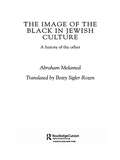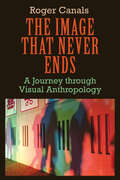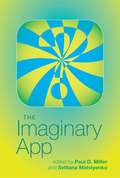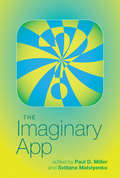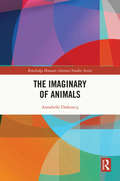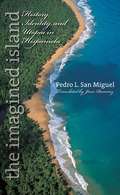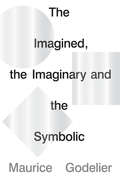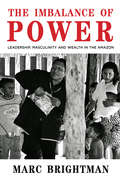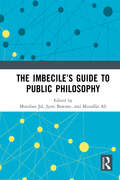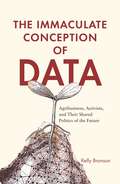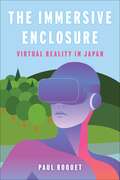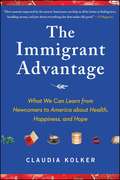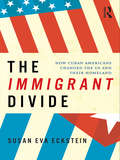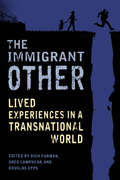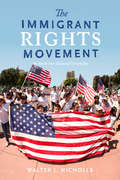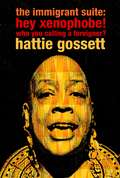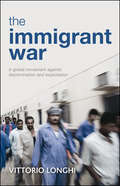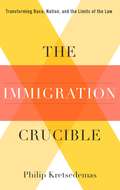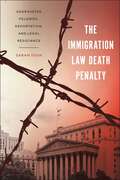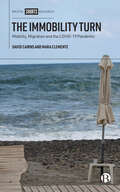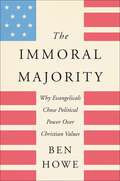- Table View
- List View
The Image of the Artist in Archaic and Classical Greece
by Guy HedreenThis book explores the persona of the artist in Archaic and Classical Greek art and literature. Guy Hedreen argues that artistic subjectivity, first expressed in Athenian vase-painting of the sixth century BCE and intensively explored by Euphronios, developed alongside a self-consciously constructed persona of the poet. He explains how poets like Archilochos and Hipponax identified with the wily Homeric character of Odysseus as a prototype of the successful narrator, and how the lame yet resourceful artist-god Hephaistos is emulated by Archaic vase-painters such as Kleitias. In lyric poetry and pictorial art, Hedreen traces a widespread conception of the artist or poet as socially marginal, sometimes physically imperfect, but rhetorically clever, technically peerless, and a master of fiction. Bringing together in a sustained analysis the roots of subjectivity across media, this book offers a new way of studying the relationship between poetry and art in ancient Greece.
The Image of the Black in Jewish Culture: A History of the Other (Routledge Jewish Studies Series)
by Abraham MelamedThe evolving image of the Black in the history of Jewish culture is being traced here in the conceptual framework of recent post-modern theories of the 'other'. The study focuses on the mechanisms by which an ethno-religious minority group considered by the dominant majority to be the inferior 'other' identifies its own inferior other. While until recently most scholarly attention has been devoted to the attitudes towards the Jews as 'other', this is the first comprehensive discussion of the attitudes of the Jews to their own 'others'.
The Image that Never Ends: A Journey through Visual Anthropology
by Roger CanalsWe live in a time of profound transformation in the field of image and visual culture. Roger Canals redefines visual anthropology from both a theoretical and practical perspective, drawing on numerous examples from everyday life as well as insights from his own films and research. This book explores the relationship between images and anthropology, offering a deeper understanding of how visual culture shapes our world. It addresses how anthropology can help us reflect on the role of images in daily life and reconsider classic anthropological themes—ritual, kinship, and power—through the lens of contemporary visuality.
The Imaginary App
by Paul D. Miller Svitlana MatviyenkoMobile apps promise to deliver (h)appiness to our devices at the touch of a finger or two. Apps offer gratifyingly immediate access to connection and entertainment. The array of apps downloadable from the app store may come from the cloud, but they attach themselves firmly to our individual movement from location to location on earth. In The Imaginary App, writers, theorists, and artists--including Stephen Wolfram (in conversation with Paul Miller) and Lev Manovich--explore the cultural and technological shifts that have accompanied the emergence of the mobile app. These contributors and interviewees see apps variously as "a machine of transcendence," "a hulking wound in our nervous system," or "a promise of new possibilities." They ask whether the app is an object or a relation, and if it could be a "metamedium" that supersedes all other artistic media. They consider the control and power exercised by software architecture; the app's prosthetic ability to enhance certain human capacities, in reality or in imagination; the app economy, and the divergent possibilities it offers of making a living or making a fortune; and the app as medium and remediator of reality.Also included (and documented in color) are selected projects by artists asked to design truly imaginary apps, "icons of the impossible." These include a female sexual arousal graph using Doppler images; "The Ultimate App," which accepts a payment and then closes, without providing information or functionality; and "iLuck," which uses GPS technology and four-leaf-clover icons to mark places where luck might be found.ContributorsChristian Ulrik Andersen, Thierry Bardini, Nandita Biswas Mellamphy, Benjamin H. Bratton, Drew S. Burk, Patricia Ticineto Clough, Robbie Cormier, Dock Currie, Dal Yong Jin, Nick Dyer-Witheford, Ryan and Hays Holladay, Atle Mikkola Kjøsen, Eric Kluitenberg, Lev Manovich, Vincent Manzerolle, Svitlana Matviyenko, Dan Mellamphy, Paul D. Miller aka DJ Spooky That Subliminal Kid, Steven Millward, Anna Munster, Søren Bro Pold, Chris Richards, Scott Snibbe, Nick Srnicek, Stephen Wolfram
The Imaginary App (Software Studies)
by Paul D. Miller Svitlana MatviyenkoThe mobile app as technique and imaginary tool, offering a shortcut to instantaneous connection and entertainment.Mobile apps promise to deliver (h)appiness to our devices at the touch of a finger or two. Apps offer gratifyingly immediate access to connection and entertainment. The array of apps downloadable from the app store may come from the cloud, but they attach themselves firmly to our individual movement from location to location on earth. In The Imaginary App, writers, theorists, and artists—including Stephen Wolfram (in conversation with Paul Miller) and Lev Manovich—explore the cultural and technological shifts that have accompanied the emergence of the mobile app. These contributors and interviewees see apps variously as “a machine of transcendence,” “a hulking wound in our nervous system,” or “a promise of new possibilities.” They ask whether the app is an object or a relation, and if it could be a “metamedium” that supersedes all other artistic media. They consider the control and power exercised by software architecture; the app's prosthetic ability to enhance certain human capacities, in reality or in imagination; the app economy, and the divergent possibilities it offers of making a living or making a fortune; and the app as medium and remediator of reality.Also included (and documented in color) are selected projects by artists asked to design truly imaginary apps, “icons of the impossible.” These include a female sexual arousal graph using Doppler images; “The Ultimate App,” which accepts a payment and then closes, without providing information or functionality; and “iLuck,” which uses GPS technology and four-leaf-clover icons to mark places where luck might be found.ContributorsChristian Ulrik Andersen, Thierry Bardini, Nandita Biswas Mellamphy, Benjamin H. Bratton, Drew S. Burk, Patricia Ticineto Clough, Robbie Cormier, Dock Currie, Dal Yong Jin, Nick Dyer-Witheford, Ryan and Hays Holladay, Atle Mikkola Kjøsen, Eric Kluitenberg, Lev Manovich, Vincent Manzerolle, Svitlana Matviyenko, Dan Mellamphy, Paul D. Miller aka DJ Spooky That Subliminal Kid, Steven Millward, Anna Munster, Søren Bro Pold, Chris Richards, Scott Snibbe, Nick Srnicek, Stephen Wolfram
The Imaginary of Animals (Routledge Human-Animal Studies Series)
by Annabelle DufourcqThis book explores the phenomenon of animal imagination and its profound power over the human imagination. It examines the structural and ethical role that the human imagination must play to provide an interface between humans’ subjectivity and the real cognitive capacities of animals. The book offers a systematic study of the increasing importance of the metaphors, the virtual, and figures in contemporary animal studies. It explores human-animal and real-imaginary dichotomies, revealing them to be the source of oppressive cultural structures. Through an analysis of creative, playful and theatric enactments and mimicry of animal behaviors and communication, the book establishes that human imagination is based on animal imagination. This helps redefine our traditional knowledge about animals and presents new practices and ethical concerns in regard to the animals. The book strongly contends that allowing imagination to play a role in our relation to animals will lead to the development of a more empathetic approach towards them. Drawing on works in phenomenology, contemporary animal philosophy, as well as ethological evidence and biosemiotics, this book is the first to rethink the traditional philosophical concepts of imagination, images, the imaginary, and reality in the light of a zoocentric perspective. It will appeal to philosophers, scholars and students in the field of animal studies, as well as anyone interested in human and non-human imaginations.
The Imagined Island
by Pedro L. San MiguelIn a landmark study of history, power, and identity in the Caribbean, Pedro L. San Miguel examines the historiography of Hispaniola, the West Indian island shared by Haiti and the Dominican Republic. He argues that the national identities of (and often the tense relations between) citizens of these two nations are the result of imaginary contrasts between the two nations drawn by historians, intellectuals, and writers. Covering five centuries and key intellectual figures from each country, San Miguel bridges literature, history, and ethnography to locate the origins of racial, ethnic, and national identity on the island. He finds that Haiti was often portrayed by Dominicans as "the other--first as a utopian slave society, then as a barbaric state and enemy to the Dominican Republic. Although most of the Dominican population is mulatto and black, Dominican citizens tended to emphasize their Spanish (white) roots, essentially silencing the political voice of the Dominican majority, San Miguel argues. This pioneering work in Caribbean and Latin American historiography, originally published in Puerto Rico in 1997, is now available in English for the first time.
The Imagined, the Imaginary and the Symbolic
by Maurice GodelierExploring the close relationship between the real and the symbolic and imaginaryWhat you imagined is not always imaginary, but everything that is imaginary is imagined. It is by imagining that people make the impossible become possible. In mythology or religion, however, those things that are imagined are never experienced as being imaginary by believers. The realm of the imagined is even more real than the real; it is super-real, surreal.Lévi-Strauss held that "the real, the symbolic and the imaginary" are three separate orders. Maurice Godelier demonstrates the contrary: that the real is not separate from the symbolic and the imaginary. For instance, for a portion of humanity, rituals and sacred objects and places attest to the reality and therefore the truth that God, gods or spirits exist. The symbolic enables people to signify what they think and do, encompassing thought, spilling over into the whole body, but also pervading temples, palaces, tools, foods, mountains, the sea, the sky and the earth. It is real.Godelier's book goes to the strategic heart of the social sciences, for to examine the nature and role of the imaginary and the symbolic is also to attempt to account for the basic components of all societies and ultimately of human existence. And these aspects in turn shape our social and personal identity.
The Imbalance of Power: Leadership, Masculinity and Wealth in the Amazon
by Marc BrightmanAmerindian societies have an iconic status in classical political thought. For Montaigne, Hobbes, Locke, Hume and Rousseau, the native American ‘state of nature’ operates as a foil for the European polity. Challenging this tradition, The Imbalance of Power demonstrates ethnographically that the Carib speaking indigenous societies of the Guiana region of Amazonia do not fit conventional characterizations of ‘simple’ political units with ‘egalitarian’ political ideologies and ‘harmonious’ relationships with nature. Marc Brightman builds a persuasive and original theory of Amerindian politics: far from balanced and egalitarian, Carib societies are rife with tension and difference; but this imbalance conditions social dynamism and a distinctive mode of cohesion. The Imbalance of Power is based on the author’s fieldwork in partnership with Vanessa Grotti, who is working on a companion volume entitled Living with the Enemy: First Contacts and the Making of Christian Bodies in Amazonia.
The Imbecile’s Guide to Public Philosophy
by Murzban JalThis book studies the role of serious philosophizing in everyday life and looks at how authoritarianism negates philosophical and public reason. It sheds light on how philosophy can go beyond its life as a discipline limited to an esoteric group of academia to manifest itself via radical discursive practices in public life which enable us to understand and resolve contemporary socio-political challenges. It studies philosophy as a discipline which deals with one's orientations based on experience, the logic of reasoning, critical thinking, and most of all radical and progressive beliefs. The book argues that the contemporary rise of capitalism in modern society, resonating Émile Durkheim’s cautions on "anomie", has favoured individualism, differentiation, marginalization, and exploitation, balanced on an eroding collective consciousness and a steady disintegration of humanity and reason. Taking this into consideration, it discusses how philosophy, both mainstream and marginal, can revive democracy in society which then is able to confront global authoritarianism led by the figure of the imbecile. Finally, it also provides a range of new perspectives on the questions of civic freedom, hegemony of language, social justice, identity, invisible paradigms, gender justice, democracy, multiculturalism, and decolonization. This book is an invigorating compilation of essays from diverse disciplines, engaging the need to create a humanistic public philosophy to transcend the state of imbecility. It will be of great interest to students, scholars and researchers of philosophy, contemporary politics, history, and sociology, as well as general readers.
The Immaculate Conception of Data: Agribusiness, Activists, and Their Shared Politics of the Future
by Kelly BronsonEvery new tractor now contains built-in sensors that collect data and stream it to cloud-based infrastructure. Seed and chemical companies are using these data, and these agribusinesses are a form of big tech alongside firms like Google and Facebook.The Immaculate Conception of Data peeks behind the secretive legal agreements surrounding agricultural big data to trace how it is used and with what consequences. Agribusinesses are among the oldest oligopoly corporations in the world, and their concentration gives them an advantage over other food system actors. Kelly Bronson explores what happens when big data get caught up in pre-existing arrangements of power. Her richly ethnographic account details the work of corporate scientists, farmers using the data, and activist “hackers” building open-source data platforms. Actors working in private and public contexts have divergent views on whom new technology is for, how it should be developed, and what kinds of agriculture it should support. Surprisingly, despite their differences, these groups share a way of speaking about data and its value for the future. Bronson calls this the immaculate conception of data, arguing that this phenomenon is a dangerous framework for imagining big data and what it might do for society.Drawing our attention to agriculture as an important new site for big tech criticism, The Immaculate Conception of Data uniquely bridges science and technology studies, critical data studies, and food studies, bringing to light salient issues related to data justice and a sustainable food system.
The Immersive Enclosure: Virtual Reality in Japan
by Paul RoquetAlthough virtual reality promises to immerse a person in another world, its true power lies in its ability to sever a person’s spatial situatedness in this one. This is especially clear in Japan, where the VR headset has been embraced as a way to block off existing social environments and reroute perception into more malleable virtual platforms. Is immersion just another name for enclosure?In this groundbreaking analysis of virtual reality, Paul Roquet uncovers how the technology is reshaping the politics of labor, gender, home, and nation. He examines how VR in Japan diverged from American militarism and techno-utopian visions and became a tool for renegotiating personal space. Individuals turned to the VR headset to immerse themselves in three-dimensional worlds drawn from manga, video games, and genre literature. The Japanese government promised VR-operated robots would enable a new era of remote work, targeting those who could not otherwise leave home. Middle-aged men and corporate brands used VR to reimagine themselves through the virtual bodies of anime-styled teenage girls. At a time when digital platforms continue to encroach on everyday life, The Immersive Enclosure takes a critical look at these attempts to jettison existing social realities and offers a bold new approach for understanding the media environments to come.
The Immigrant Advantage
by Claudia KolkerDo you have a relative or friend who would gladly wait on you, hand and foot, for a full month after you had a baby? How about someone to deliver a delicious, piping hot home-cooked meal, just like your mother's, right to your front door after work? Do you know people you'd trust enough to give several hundred dollars a month to, with no receipt, on the simple promise that the accumulated wealth will come back to you a year later? Not many of us can answer "yes" to these questions. But as award-winning journalist Claudia Kolker has discovered, each of these is one of a wide variety of cherished customs brought to the United States by immigrant groups, often adapted to American life by the second generation in a distinctive blending of old and new. Taken together, these extraordinary traditions may well contribute to what's known as "the immigrant paradox," the growing evidence that immigrants, even those from poor or violence-wracked countries, tend to be both physically and mentally healthier than most native-born Americans. These customs are unfamiliar to most Americans, but they shouldn't be. Honed over centuries, they provide ingenious solutions to daily challenges most of us face and provide both social support and comfort. They range from Vietnamese money clubs that help people save and Mexican cuarentenas--a forty-day period of rest for new mothers--to Korean afterschools that offer highly effective tutoring at low cost and Jamaican multigenerational households that help younger family members pay for college and, eventually, their own homes. Fascinated by the success of immigrant friends, Claudia Kolker embarked on a journey to uncover how these customs are being carried on and adapted by the second and third generations, and how they can enrich all of our lives. In a beautifully written narrative, she takes readers into the living rooms, kitchens, and restaurants of immigrant families and neighborhoods all across the country, exploring the sociable street life of Chicago's "Little Village," a Mexican enclave with extraordinarily low rates of asthma and heart disease; the focused quiet of Korean afterschool tutoring centers; and the loving, controlled chaos of a Jamaican extended-family home. She chronicles the quests of young Indian Americans to find spouses with the close guidance of their parents, revealing the benefits of "assisted marriage," an American adaptation of arranged marriage. And she dives with gusto into some of the customs herself, experimenting to see how we might all fit them into our lives. She shows us the joy, and excitement, of savoring Vietnamese "monthly rice" meals delivered to her front door, hiring a tutor for her two young girls, and finding a powerful sense of community in a money-lending club she started with friends. The Immigrant Advantage is an adventurous exploration of little-known traditional wisdom, and how in this nation of immigrants our lives can be enriched by the gifts of our newest arrivals.
The Immigrant Advantage: What We Can Learn from Newcomers to America about Health, Happiness and Hope
by Claudia KolkerDo you have a relative or friend who would gladly wait on you, hand and foot, for a full month after you had a baby? How about someone to deliver a delicious, piping hot home-cooked meal, just like your mother's, right to your front door after work? Do you know people you'd trust enough to give several hundred dollars a month to, with no receipt, on the simple promise that the accumulated wealth will come back to you a year later? Not many of us can answer "yes" to these questions. But as award-winning journalist Claudia Kolker has discovered, each of these is one of a wide variety of cherished customs brought to the United States by immigrant groups, often adapted to American life by the second generation in a distinctive blending of old and new. Taken together, these extraordinary traditions may well contribute to what's known as "the immigrant paradox," the growing evidence that immigrants, even those from poor or violence-wracked countries, tend to be both physically and mentally healthier than most native-born Americans. These customs are unfamiliar to most Americans, but they shouldn't be. Honed over centuries, they provide ingenious solutions to daily challenges most of us face and provide both social support and comfort. They range from Vietnamese money clubs that help people save and Mexican cuarentenas--a forty-day period of rest for new mothers--to Korean afterschools that offer highly effective tutoring at low cost and Jamaican multigenerational households that help younger family members pay for college and, eventually, their own homes. Fascinated by the success of immigrant friends, Claudia Kolker embarked on a journey to uncover how these customs are being carried on and adapted by the second and third generations, and how they can enrich all of our lives. In a beautifully written narrative, she takes readers into the living rooms, kitchens, and restaurants of immigrant families and neighborhoods all across the country, exploring the sociable street life of Chicago's "Little Village," a Mexican enclave with extraordinarily low rates of asthma and heart disease; the focused quiet of Korean afterschool tutoring centers; and the loving, controlled chaos of a Jamaican extended-family home. She chronicles the quests of young Indian Americans to find spouses with the close guidance of their parents, revealing the benefits of "assisted marriage," an American adaptation of arranged marriage. And she dives with gusto into some of the customs herself, experimenting to see how we might all fit them into our lives. She shows us the joy, and excitement, of savoring Vietnamese "monthly rice" meals delivered to her front door, hiring a tutor for her two young girls, and finding a powerful sense of community in a money-lending club she started with friends. The Immigrant Advantage is an adventurous exploration of little-known traditional wisdom, and how in this nation of immigrants our lives can be enriched by the gifts of our newest arrivals.
The Immigrant Divide: How Cuban Americans Changed the U.S. and Their Homeland
by Susan EcksteinAre all immigrants from the same home country best understood as a homogeneous group of foreign-born? Or do they differ in their adaptation and transnational ties depending on when they emigrated and with what lived experiences? Between Castro’s rise to power in 1959 and the early twenty-first century more than a million Cubans immigrated to the United States. While it is widely known that Cuban émigrés have exerted a strong hold on Washington policy toward their homeland, Eckstein uncovers a fascinating paradox: the recent arrivals, although poor and politically weak, have done more to transform their homeland than the influential and prosperous early exiles who have tried for half a century to bring the Castro regime to heel. The impact of the so-called New Cubans is an unintended consequence of the personal ties they maintain with family in Cuba, ties the first arrivals oppose. This historically-grounded, nuanced book offers a rare in-depth analysis of Cuban immigrants’ social, cultural, economic, and political adaptation, their transformation of Miami into the "northern most Latin American city," and their cross-border engagement and homeland impact. Eckstein accordingly provides new insight into the lives of Cuban immigrants, into Cuba in the post Soviet era, and into how Washington’s failed Cuba policy might be improved. She also posits a new theory to deepen the understanding not merely of Cuban but of other immigrant group adaptation.
The Immigrant Other
by Rich Furman Greg Lamphear Douglas EppsAbsent from the debate over immigration policy is an unambiguous portrait of that policy's effect on human lives. Each chapter in this anthology pairs a description of specific state, national, and transnational laws and regulations with the testimony of individuals struggling to find legitimacy and sanctuary among them.The people profiled in this book shed light on a system designed to dehumanize and disenfranchise them, and they describe the difficulty of finding shelter in an increasingly globalized and unsympathetic world. They include Muslims facing discrimination from both the "War on Terror" and the "War on Immigration;" Latino day laborers; Filipino immigrants supporting themselves and their families back home; and Brazilian parents terrified of being separated from their naturalized children. Immigrants living in Spain, Australia, Greece, and Qatar are also represented, showcasing the similarities and differences in the treatment of immigrants worldwide. By prioritizing these accounts, this volume makes the day-to-day realities of current law clear to anyone who hopes to craft better immigration policy and social work practice with immigrants. It also restores the humanity of those who have become "other" simply by being born in an untenable place at a troubled time.Scholars in sociology, psychology, health, social work, and public policy can use these accounts to suggest better policy and practice, giving vulnerable immigrants a say in how they are governed.
The Immigrant Other: Lived Experiences in a Transnational World
by Douglas Rich Greg Furman Lamphear EppsThe immigrants profiled in The Immigrant Other shed light on a system designed to dehumanize and disenfranchise them, and they describe the difficulty of finding shelter in an increasingly globalized and unsympathetic world. They include Muslims facing discrimination from both the "War on Terror" and the "War on Immigration," Latino day laborers, Filipino immigrants supporting themselves and their families back home, and Brazilian parents terrified of being separated from their naturalized children. Immigrants living in Spain, Australia, Greece, and Qatar are also represented, showcasing the similarities and differences in the treatment of immigrants worldwide. Each chapter in this anthology pairs a description of specific state, national, and transnational immigration laws and regulations with the testimony of individuals struggling to find legitimacy and sanctuary among them.
The Immigrant Rights Movement: The Battle over National Citizenship
by Walter J. NichollsIn the months leading up to the 2016 presidential election, liberal outcry over ethnonationalist views promoted a vision of America as a nation of immigrants. Given the pervasiveness of this rhetoric, it can be easy to overlook the fact that the immigrant rights movement began in the US relatively recently. This book tells the story of its grassroots origins, through its meteoric rise to the national stage. Starting in the 1990s, the immigrant rights movement slowly cohered over the demand for comprehensive federal reform of immigration policy. Activists called for a new framework of citizenship, arguing that immigrants deserved legal status based on their strong affiliation with American values. During the Obama administration, leaders were granted unprecedented political access and millions of dollars in support. The national spotlight, however, came with unforeseen pressures—growing inequalities between factions and restrictions on challenging mainstream views. Such tradeoffs eventually shattered the united front. The Immigrant Rights Movement tells the story of a vibrant movement to change the meaning of national citizenship, that ultimately became enmeshed in the system that it sought to transform.
The Immigrant Suite: Hey Xenophobe, Who You Calling a Foreigner?
by Hattie GossettWriting from the upper west side of Manhattan, where Harlem intersects with waves of immigrants from the Dominican Republic, Cuba, Puerto Rico, Korea, Cambodia, Ivory Coast, India, Native America, and from all over the globe, Hattie Gossett vividly invokes her neighborhood experience. With wit and candor, she questions why so many people are forced from their home countries, only to be despised as interlopers in the United States; why older immigrants see younger ones as the enemy; who gets paid a living wage, who gentrifies their neighborhood, and who sends their money back home. From the grocery store to the cleaners to the tenement walk-up and everywhere in between, Gossett captures the voices overheard and imagined in this breathless immigrant suite.
The Immigrant War: A Global Movement Against Discrimination and Exploitation
by Vittorio LonghiThe abuse of Asian workers in the oil-rich Gulf countries, the trafficking of undocumented latinos at the US border, the exploitation of African sans papiers in France and the attacks on Sub-Saharan farmhands by the mob in Italy. All these events show how migrants, especially those without legal documents, can be an easy target for violence and discrimination, often with impunity. At least, until they decide to fight back. In this original, accessible book, Vittorio Longhi, a journalist who specialises in international labour matters, describes an emerging phenomenon of social conflict, in which migrants are not conceived as passive victims of exploitation. Instead they are portrayed as conscious, vital social actors who are determined to organise and claim better rights. With a global perspective, The immigrant war highlights the 'struggle for human rights, citizenship and equality', in the context of a policy vacuum within the international community towards migration. He demonstrates how these emerging conflicts can break the chain of exploitation and contribute to rethinking failing migration policies and the role of migrants in contemporary societies. The book will be of interest to labour and migration specialists, students of social sciences, trade unionists and human rights activists, as well as a general readership interested in migration.
The Immigration Crucible: Transforming Race, Nation, and the Limits of the Law
by Philip KretsedemasIn the debate over U. S. immigration, all sides now support policy and practice that expand the parameters of enforcement. Philip Kretsedemas examines this development from several different perspectives, exploring recent trends in U.S. immigration policy, the rise in extralegal state power over the course of the twentieth century, and discourses on race, nation, and cultural difference that have influenced politics and academia. He also analyzes the recent expansion of local immigration law and explains how forms of extralegal discretionary authority have become more prevalent in federal immigration policy, making the dispersion of local immigration laws possible. While connecting such extralegal state powers to a free flow position on immigration, Kretsedemas also observes how these same discretionary powers have been used historically to control racial minority populations, particularly African Americans under Jim Crow. This kind of discretionary authority often appeals to "states rights" arguments, recently revived by immigration control advocates. Using these and other examples, Kretsedemas explains how both sides of the immigration debate have converged on the issue of enforcement and how, despite differing interests, each faction has shaped the commonsense assumptions defining the debate.
The Immigration Law Death Penalty: Aggravated Felonies, Deportation, and Legal Resistance
by Sarah ToshTraces the role of the aggravated felony in today’s deportation regimeIn immigration courts across America, a non-citizen convicted of an “aggravated felony” will almost certainly face deportation with no access to asylum. However, despite the ominous-sounding name, aggravated felonies need not be either “aggravated” or “felonies.” The term encompasses more than thirty offenses, ranging from check fraud and shoplifting to filing a false tax return. The recent expansion in the list of such offenses has resulted in astronomical rates of deportation.This book chronicles the rise of the use of the aggravated felony, known by lawyers as the “immigration law death penalty,” to criminalize and then deport immigrants. Immigrants convicted of aggravated felonies are subject to mandatory detention and almost certain deportation—and are ineligible for almost all forms of legal relief from removal. Furthermore, immigrants convicted of aggravated felonies can be detained for months or even years without bond, are not guaranteed lawyers, and can even be deported without an opportunity to plead their case in court. Sarah Tosh provides the first in-depth understanding of how aggravated felonies have been used to deport thousands of documented and undocumented immigrants and how the severe, expansive, and racially disparate outcomes have been met with innovative legal responses, bolstered by networks of community-based resistance. The Immigration Law Death Penalty is an urgent read for anyone committed to protecting the rights of immigrants nationwide.
The Immigration and Nationality Act of 1965
by Gabriel J. ChinAlong with the civil rights and voting rights acts, the Immigration and Nationality Act of 1965 is one of the most important bills of the civil rights era. The Act's political, legal, and demographic impact continues to be felt, yet its legacy is controversial. The 1965 Act was groundbreaking in eliminating the white America immigration policy in place since 1790, ending Asian exclusion, and limiting discrimination against Eastern European Catholics and Jews. At the same time, the Act discriminated against gay men and lesbians, tied refugee status to Cold War political interests, and shattered traditional patterns of Mexican migration, setting the stage for current immigration politics. Drawing from studies in law, political science, anthropology, and economics, this book will be an essential tool for any scholar or student interested in immigration law.
The Immobility Turn: Mobility, Migration and the COVID-19 Pandemic
by David Cairns Mara ClementeThis book looks at the changes that have taken place in the wake of the COVID-19 pandemic, following the lockdown of societies and imposition of border controls in an attempt to limit the spread of the virus. Using empirical evidence from Portugal, a geopolitically important point of intersection within Europe and between Global South and Global North, the book examines consequences of the apparent end of mobility expansionism, developing a refreshing theoretical concept of ‘immobility turn.’ Focusing on the tourist industry, universities hosting international students and migration agencies, the book offers invaluable insights about how the pandemic affected institutions and individuals’ lives, informing policy-making processes on a global level.
The Immoral Majority: Why Evangelicals Chose Political Power Over Christian Values
by Ben HoweAn analysis of why and how the Religious Right could vote for Donald Trump in 2016, and how the movement can redeem itself and get back on track.In 2016, writer and filmmaker Ben Howe found himself disillusioned with the religious movement he’d always called home. In the pursuit of electoral victory, many American evangelicals embraced moral relativism and toxic partisanship.In The Immoral Majority, Howe—still a believer and still deeply conservative—analyzes and debunks the intellectual dishonesty and manipulative rhetoric that evangelical leaders use to convince Christians to toe the Republican Party line. He covers the history of the Christian Right, as well as the events of the last three decades that led to the current state of the conservative movement at large.As long as evangelicals prioritize power over persuasion, Howe argues, their pews will be empty and their national influence will dwindle. If evangelicals hope to avoid cultural irrelevance, it means valuing the eternal over the ephemeral, humility over ego, and resisting the seduction of political power, no matter the cost. The Immoral Majority demonstrates how the Religious Right is choosing the profits of this world at the cost of its soul—and why it’s not too late to change course.

